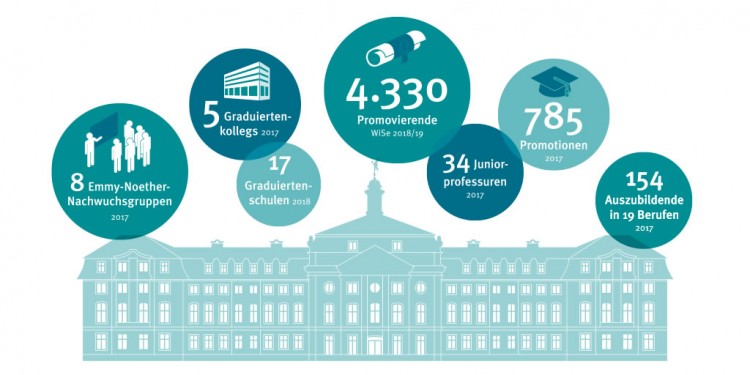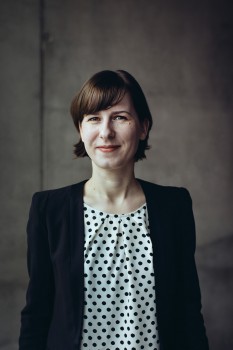
"Many systems in other countries are ahead of us"
Junior researchers at universities are promoted in a variety of ways, for example through PhDs, graduate schools and associate professorships. There are a great number of qualification measures on offer which are also designed to ensure transparency and make planning easier. Kathrin Nolte spoke to Prof. Jule Specht, a member of the Junge Akademie in Berlin and Professor of Personality Psychology at Humboldt University Berlin, about the challenges for German universities in promoting junior researchers.
What status does promoting junior researchers have at German universities?
First of all, of course, there is the question of who actually counts as a junior researcher. Students? The number of students is at an historic high: never before have so many people been studying, and an ever-increasing number of school-leavers are opting to go to university. Or is it the PhD students who constitute the junior researchers at university? Here, too, we have seen their numbers rise over the past few years – due mainly to the large number of fixed-term projects receiving third-party funding which have given rise to many additional jobs. So these junior researchers have an important status purely from the point of view of the numbers.
Often, though, researchers who already have their PhD, but who have no permanent position at a university, are also numbered among junior researchers – which is clearly an inappropriate designation for these colleagues, who have been researching and teaching for years and who play a central part in academic progress. In my view, this group does not have a sufficiently high status when you look at the conditions of employment and the career prospects they have.

Not a lot. Many systems in other countries are ahead of us as regards promoting the next generation of researchers. Students here often find themselves in overcrowded courses, and the ratio of students to professors is a catastrophe by international standards. Although PhD students here are paid for their work, in contrast to some other countries, in most subjects it is on a pro rata basis. But – and this affects the great majority of PhD students – anyone who has a 50 or 65 percent position, but nevertheless works 40 hours a week, ultimately has net hourly earnings of less than ten euros.
The period after gaining a PhD – which is a long time, typically lasting more than ten years – is also marked by a series of limited contracts with only a small chance of anything more permanent. True, there are many attractive formats, with third-party funding, for promoting junior researchers – for example, ERC Starting Grants or the Emmy Noether Junior Researchers Group funded by the German Research Foundation – and these make a lot of funding available to allow researchers to undertake independent research work on their own subjects. But the German academic system holds out far too little prospect of long-term employment, even for those researchers who are successful in their work in the programmes I just mentioned.
What makes for good supervision of PhD students and post-docs?
The best thing would be to ask the students themselves. The Max Planck Society’s PhD students networks PhDnet and N2, for example, which operate nationwide here in Germany, have published some interesting statements on the subject. As a supervisor myself, I attach great importance to independent working and to collegiality, and I see myself primarily as a provider of ideas and as a mentor. Looking back on the time when I was doing my own PhD at the University of Münster, I’m grateful for the fact that I received a lot of inspiration there while working independently on my research topic, and that just one year after I got my PhD I was able to enjoy a lot of freedom to do research and teach as an associate professor. Generally, I think that limited-contract post-doc positions which involve having to follow instructions should be upgraded to tenure-track professorships. After completion of a PhD, any supervision in the narrow sense of the word can be replaced by mentoring from colleagues if necessary.
How can a balance be achieved between "dependence" and a partnership of equals between PhD students and their supervisor?
Primarily by reducing the multiple functions that supervisors have. In Germany they are often the providers of funding, entitled to issue instructions, as well as being mentors; they are responsible for making assessments as well for supervising. These multiple functions may conflict with each other and ultimately lead to an unnecessarily strong dependence. It would be better to allocate PhD students not to individual chairs but to entire institutes, to distribute the supervision to several people on a doctorate committee and have the assessments carried out by independent people.
Where do you think there is room for improvement?
Young researchers represent the future of our academic system and should be treated accordingly. If we want to keep the best people in our academic system, we must pay them adequately and offer them fair career prospects. For me, that means full-time positions for doctoral students with a full complement of working hours and tenure-track professorships with a realistic chance of a permanent appointment in the case of outstanding performance in research and teaching, instead of limited-contract post-doc positions which involve having to follow instructions and with no prospect of becoming permanent. If we can manage to achieve that, the entire academic system will benefit.
Source: "wissen|leben" No. 1, February / March 2019
